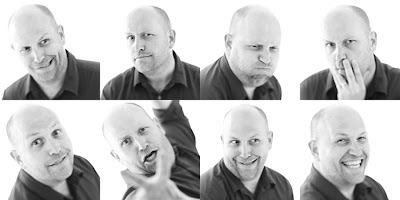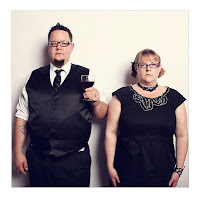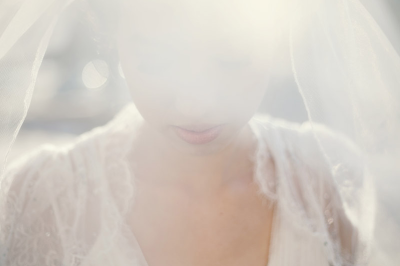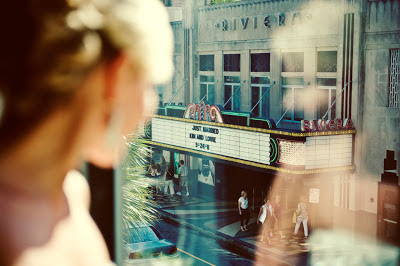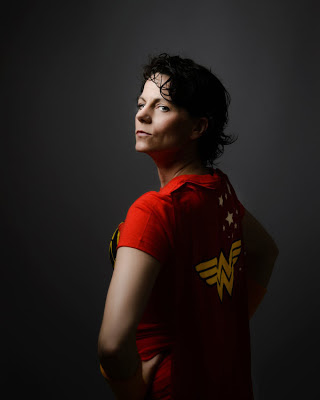features photographers who have been working as a professional photographer for five or more years. We are so grateful that these photographers are willing to share an intimate and candid look at their life behind the camera. ===========
- a Milwaukee, Wisconsin Wedding Photojournalist since 2007.
I love the snippets of the wedding day the bride and groom never get to see, but thank me to high Heaven once they see their wedding from 'my' perspective.
How did you learn the craft of photography?
Craft? I took a few photography classes in college while I was a graphic design student. I've taken several workshops and attended seminars, including the DWF Convention in Carefree, Arizona. I have numerous photography books and videos. Much of my education is simply through trial and error. …I'm still a work in progress. There's is always something to learn. The thing I continually work on is observation and timing, and it's something I can work on when I'm walking in the mall, noshing at a local restaurant, hanging out at a party. …and now watching Jonas grow up. Learning 'see' and 'anticipate' is something you can't learn from a book - it comes from 'doing', it only gets better with experience.
How did you learn the business of photography?
Much like the craft of photography, there's always something to learn, and I feel like this is the weakest aspect of my business. A lot is trial and error. I have a raging case of ADD, so I easily get side-tracked. Right now I'm supposed to be designing a wedding album and planning for a food photography portfolio shoot… I'm branching out inspired by my food package design career prior to shooting weddings. :)
Do you work from home, a studio, or something else?
I have a home office in a room over my garage. It saves on gas, and I get to see my little 1 year old every day, all day. …though I am looking for a studio I can add a kitchen and prep area for my food photography. …See? There's the ADD.
Can you share photos of your workspace (or describe it for us)?
Good lord, you do NOT want to see that mess that has become my office space. It's a disaster right now.
The room over my garage is about 225 SQ ft - with a sloped ceiling starting at 4 ft. I have a big south facing street view window, an east facing sky light. The east wall is painted electric green, the west and south walls are painted belize blue, the north wall is painted a deep fuchsia.
On the east wall, I have two birch doors sitting horizontal on 4 three foot commercial grade wire shelves to create a long production area with storage. It's table top created from the doors is wickedly durable.
On the west wall, I have one birch door laying on three saw horses to hold my HP laser printer and my Epson 3800. My computer is on typical Office Max glass desk top next to the Window. Every now and then I just need to look out the window and do a little day dreaming.
On my desk is my 26" MultiSync display, three Other World Computing Mercury Elite Pro hard drives for back-ups, my NewerTech Voyager hard drive mounting hub, my iPad mounted to the NewerTechnology swivel iPad stand (connected to a pair of Bowers & Wilkins MM-1 computer speakers), so I can play movies and TV shows while I work. I really need the background noise, and a break from music and the radio every now and then. I was on a Harry Potter and Star Blazers kick in 2012. Prior to the iPad on a stand, I used my laptop to watch movies. In 2011 I was on a Lord of the Rings extended edition kick. :)
On the Fuchsia wall, I have a library of graphic design books, photography books/DVDs, and a host of other publications for education/inspiration. My portable studio lighting kit is also tucked in a cubby back there somewhere. :)
Must gets for your work station:
Get 'em here:
Do you have regular employees, associates, or other people who help you in your business? If so, share a little about their role(s) in your business.
I don't have any employees or associates, at least not full time. Every now and then I'll contract out a second photographer IF the wedding couple wants an extra photographer.
What do you outsource, and who do you outsource it to? (Website, proofing, printing, billing, products, assistants, retouchers, accounting, etc.)
Nothing. I guess I'm a control freak when it comes to finishing the final product. …it's nasty habit carried over from my 14 year graphic design career.
How many weekly hours would you say is spent working in your photography business?
In the summer? 60-70. That entails shooting, sorting, processing, and finishing the images as well as marketing and networking. In the winter? 20-30 on wedding album design, marketing and networking.
What percentage of your business working time is spent shooting vs. working behind the scenes?
15-20% …maybe.
How did your last five clients find you and what did they hire you for?
Three from professional wedding vendor/venue referrals. One from bridal referral. One from a wedding planner.
What do you consider to be your most effective marketing efforts for your business?
Most of my Wisconsin weddings are out-of-state couples getting married in SE Wisconsin. I get couples from Chicago, to Washington DC & NYC, to Dubai, most of whom grew up in Wisconsin, so venue referrals are imperative for my business. I joined SE Wisconsin Chapter of National Association of Catered Events four years ago. I do my best to attend the monthly meetings and get my face in front of everyone. Most of us members have become good friends, we call ourselves "Nacies", so it really ends up being a night out with friends. But, aside from the phenomenally good eats and good laughs, it keeps me top of mind with many of the local wedding industry artisans, including other photographers.
I also go out of my way to really get to know the wedding the people running the wedding venues. I've become a preferred wedding photographer Whistling Straits. I love the entire staff up there, and they make me feel like a friend or wedding guest rather than just another wedding contractor. I get that feeling pretty much where ever I shoot in Milwaukee to Kohler. It's a great feeling.
What other careers or jobs did you have before (or while) you started your photography business?
I was graphic designer for 14 years. I worked in Madison, Wisconsin for three years, started my brand packaging design career in NYC. My wife and I moved back to Wisconsin, and I worked in Racine and Neenah, Wisconsin. My last job was at Design North. They had an onsite photography studio to do test photography for their food packaging clients. I spent many days in the studios, and I loved it. …it's the inspiration driving me to get behind the camera for food photography now….possibly my next step in my photography career.
How do you spend your time when you aren't working?
I spend my time with our little 1 year old, Jonas. I know a lot of people say this about their kids, but dammit, Jonas is the most adorable baby in the world. LOL
I also take Monday mornings off and go golfing with my neighbor.
What hobbies or interests outside of photography are fulfilling for you?
Golf. It's maddening, but dammit, I love it anyway. Drawing, a carry over from my art school background. We love watching movies at home or in the theaters. It's such a good escape from reality. I'm also a foodie. I love spending Sunday throwing meats in the smoker for the week. We also love restaurants. …see the connection to food photography? LOL
When Jonas gets older, we want to get back into traveling again.
Do you feel like you have a good balance between your personal and working life?
Not at all. I can't remember the last time we took an actual vacation. It's been a challenge to get my business humming, and right now the wedding aspect seems to be taking a dip. The wedding industry is SOOOO FREAKING fickle. There's no rhyme or reason when, why or how brides book photographers from one wedding season to the next, so it's virtually impossible to predict or plan for the upcoming year.
Over the next few years, I'm hoping to branch into food photography and work my ass off to get my work in front of the right people. Plus, as Jonas gets older, I don't want to work every weekend in the summer. I want to spend many summer weekends with my family. :)
Who else is in your household with you (spouse, roommate, dependents, pets ;-)?
So, there's Angie, my wife. I can't believe how much I lean on her for emotional and mental support. She has been my crutch on so many levels, and she has her own full time job - 50-60 hours a week as an Account Group Director at a prominent Advertising Agency in Milwaukee.
Jonas, our little 'man'. Dude has been walking since he was 8 months old. I need him to feel young again, but dammit, he makes me feel old too. I can't keep up with him.
Our dog, Murray (named after the 'Mad About You' dog). …and yes, he LOOKS like a Murray. He's a rescue dog from the Appleton, Wisconsin area. Some farmer was breeding puppies and selling them to the Hmong community for….food. The mother of Murray had EIGHT litters before she was rescued from the farmer, and they rescued her last litter, of which involved Murray. He's the kindest, friendliest dog I've met - which is typically a personality trait picked up from the owners. Yeah, it's true. He's wonderful with kids, and especially Jonas, but the transition has been a little hard on him. He doesn't get the attention he used to, and that'll have to change when it warms up this spring. …there is a spring coming, right?
We have two cats, Little (tiger stripe) and Tiny (pitch black) - both love Murray to pieces. Both fear Jonas to death. Tiny eats polystyrene. Little poops on our living room carpet. Tiny is a people lover and great people at the door. Little is a 'fraidy' cat, and hides the moment someone knocks on the door or rings the door bell.
What percentage of your household income is derived from your photography business? If less than 100%, what else helps pay the household bills?
2011 it was 65%, in 2012 it was 45% - Angie got a raise with her early 2012 promotion. And yes, it's been a Godsend. But, the fact our lives don't 100% depend on my photography income doesn't minimize the need for my income in anyway shape or form. And this spring, thanks to the fickle wedding industry, we're feeling the pinch as brides seem to be booking later/closer to their actual wedding date.
What have been the most challenging personal aspects of being a creative small business owner?
Managing the finances and my business debt. I'm a gear slut, and if it's not one thing I "want", it's something else. Plus there's always something breaking down, or something else actually 'needed', and it's tough to plan for it. I'm just not that good at it yet, though I'm getting better.
The worst part is getting rid of business loan. My business won't be entirely profitable until my small business loan is paid off….and that'll free up (GASP) $700/month. Yeah, that's $8,400 per year. It might not sound like a LOT of money, but really, it's a LOT of money for a small business.
What do you love about being a creative small business?
The freedom to work when I want with whom I want. I'm pretty selective. Now, with Jonas in the fold, I won't work on major recognized US vacation/holidays anymore. 4th of July, Halloween, Thanksgiving, Christmas, New Years Eve…and our birthdays. I can also take Monday mornings off to golf with my neighbor to clear my head and get me revved up/recharged for the rest of the week.
*paused* - NACE meeting survey just came in via email - there's my ADD in action…
…OK! I'm back….
If you could share any advice with a photographer getting ready to start their business today, what would it be?
February 15, 2007 was the first day I shot a wedding as a second shooter. June 16, 2007 was the very first wedding I shot by myself - With a Nikon D50, 2 SB-800's, and couple of prime lenses: Nikon 50/1.8D, 85/1.4D, 105/2DC, 180/2.8ED, 60/2.8D Macro. Start small and light, but have your back-up gear - you can't go into a wedding with one camera, one lens and one flash. If your gear goes down, you go down. It's better to have two small inexpensive kits than one really expensive camera/lens combo kit. …and if you have to, invest your money in your lenses before your start investing in expensive camera bodies. BUT!!! do it without picking up a lot of business debt.
I can't stress this enough (from personal experience): Do your best to avoid picking up business debt. Business debt can be a deep deep hole that sucks the life of you and your business….and even your family.
And regardless where you're at in your career (photography wise or business wise), it should always be "Onward and Upward". If you're not growing, you're definitely falling behind.
Please pardon any and all clams during my written babble. I'm overly busy planning for this exciting new tangent my photography career is about to take; so, no, I didn't proof read. LOL
Corey Ann is a wedding & lifestyle photographer from North Canton, OH. She is a mix of everything - fashionista, travel nut, deal hound, photo theft evangelist (she runs Photo Stealers) and geek rolled into one. She's had a website online since 1997 and a blog since 1999. When not plotting world domination or her next trip, she can be found reading one of the 100+ books she reads a year. Follow her on Twitter.


